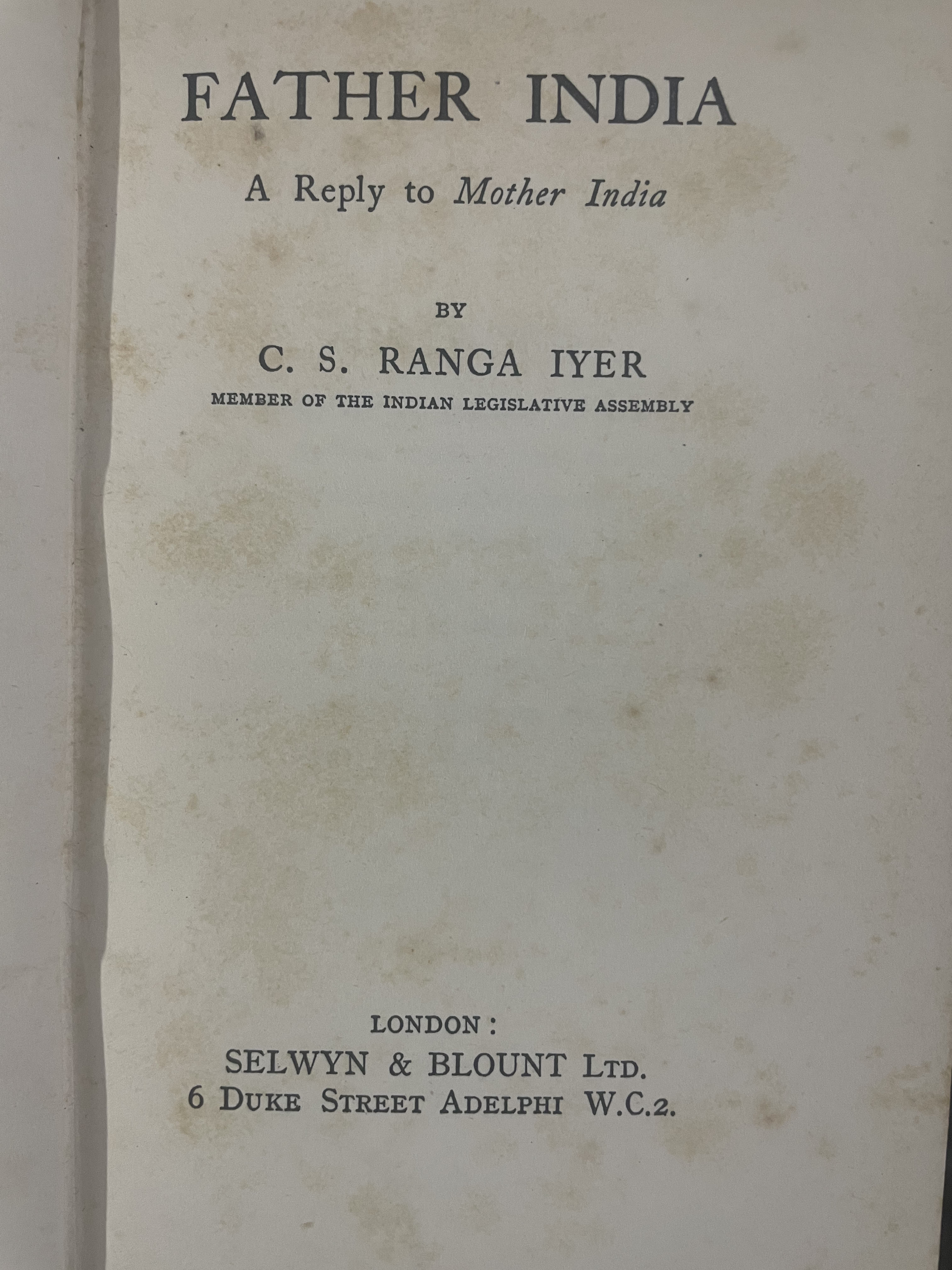Father India A reply to Mother India

About
Summary
Exquisite
TOC
Details
Related
URL
Images
Overview
Father India: A Reply to Mother India by C.S. Ranga Iyer was written as a direct response to Katherine Mayo's controversial Mother India. Iyer's book aimed to refute Mayo's negative portrayal of Indian society and culture, presenting an alternative perspective that celebrated India's strengths and potential.Father India is structured as a direct counterpoint to Mother India, addressing the specific criticisms and allegations made by Katherine Mayo. Iyer's book challenges the themes, assertions, and overall tone of Mayo's work, aiming to restore balance and provide a more nuanced and positive view of India. The Courses of Study document lists the 'Father India' of C. S. Ranga Iyer as part of its National, Regional, and Racial Histories, which implies its nature as a counter-narrative seeking to provide an alternative historical and cultural perspective.
Importance of Book
Countering Colonial Propaganda: The book serves as a crucial counterpoint to colonial propaganda, challenging the negative stereotypes and misrepresentations of India that were prevalent in Western media.
Promoting Indian Nationalism: It contributes to the growing sense of Indian nationalism, inspiring pride in Indian culture and advocating for self-rule.
Providing an Indian Perspective: It offers a valuable Indian perspective on the issues facing Indian society, challenging the dominance of Western viewpoints.
Inspiring Social Reform: It may have contributed to social reform efforts by presenting a more nuanced and constructive approach to addressing problems within Indian society.
Challenging Misinformation: The book challenges the Western view of Indian society.
Voice to the people: Iyer's book provides a voice to the people of India in response to what many considered an inaccurate and harmful representation.
Key Themes
Nationalism and Self-Determination: Iyer promotes Indian nationalism.
Cultural Pride and Identity: Iyer tries to instill a sense of pride.
Anti-Colonialism: The book is a rebuke to colonial powers.
Social Justice and Equality: It advocates for equality.
Historical perspective: Iyer aims to instill a sense of purpose for Indians.
Cultural Significance
A Response to Colonial Stereotypes: The book is a direct and forceful response to colonial stereotypes and prejudices, challenging the dominant Western narrative about India.
An Expression of Indian Identity: It expresses a strong sense of Indian identity, celebrating Indian culture, values, and achievements.
A Contribution to the Nationalist Movement: The book contributes to the intellectual and political ferment of the Indian nationalist movement, strengthening the demand for self-rule.
Effects on Society
Boosting National Morale: The book may have helped boost the morale of Indians, inspiring confidence in their ability to govern themselves and build a better future.
Shaping Public Discourse: It may have influenced public discourse, promoting a more nuanced and balanced understanding of Indian society and culture.
Inspiring Social and Political Activism: The book could have inspired social and political activism, encouraging people to fight for justice, equality, and self-determination.
The book might influence more accurate and nuanced depiction's of India: "Father India" likely influenced people both in and outside of India to consider Indian viewpoints and resist the stereotypes that were often perpetuated regarding their culture.
Conclusion
Father India: A Reply to Mother India by C.S. Ranga Iyer is a critical response to Katherine Mayo's controversial book. Its importance lies in its role as a counter-narrative, challenging colonial stereotypes and promoting Indian nationalism. Its key themes include self-determination, cultural pride, anti-colonialism, and social justice. Its cultural significance stems from its contribution to the Indian independence movement and its articulation of a distinct Indian identity. The book likely had a lasting effect on country and society, boosting national morale, shaping public discourse, and inspiring social and political activism.
Title
Father India A reply to Mother India
Author
C S Ranga Iyer
Name of Publisher
Selwyn & Blount Ltd London
Publish Date
1927
Subject
View of Indian society
Vintage
1901-1947
Edition
First
Number of Pages
207
Category
Literary
Sub Category
Biography
Rarity
RARE
